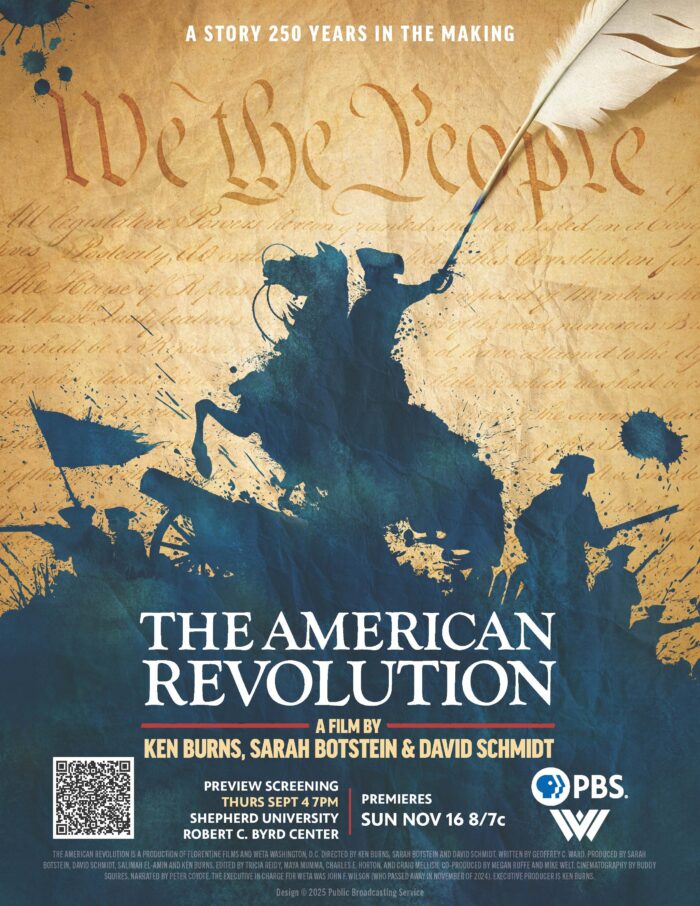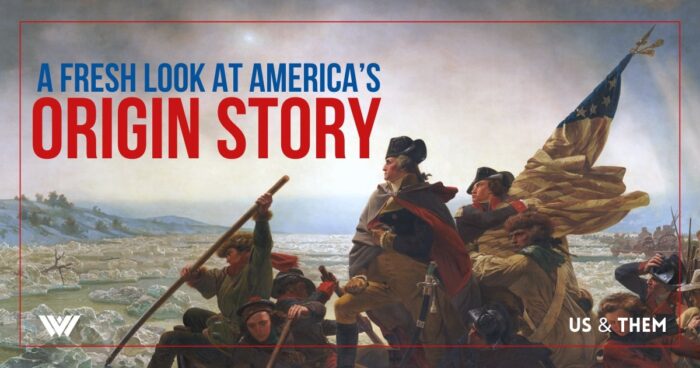Your browser doesn't support audio playback.
As the United States prepares to mark the 250th anniversary of the Declaration of Independence, attention is focused on the relevance of the American Revolution to our country today.
The new episode of Us & Them spotlights a recent community event at Shepherd University in Shepherdstown, West Virginia with host Trey Kay and three top historians to talk about the realities of our revolutionary past.
Ken Burns’ upcoming PBS series The American Revolution shines a light on the war that transformed 13 colonies into a nation. This timely episode of Us & Them revisits America’s origin story with fresh eyes, probing what we remember, what we forget, and why it matters now.
This episode of Us & Them is presented with support from WETA and the CRC Foundation.
Subscribe to Us & Them on Apple Podcasts, NPR One, RadioPublic, Spotify, Stitcher or wherever you get your podcasts.

West Virginia Public Broadcasting recently hosted a community conversation ahead of the PBS documentary series The American Revolution, produced by Ken Burns, Sarah Botstein and David Schmidt. The series, eight years in the making, premieres Sunday, Nov. 16, 2025 — on the eve of the 250th anniversary of the war’s start. The American Revolution traces how 13 British colonies rebelled, won independence and formed a new government that reshaped the continent and inspired democratic movements worldwide.
Photo courtesy of the Byrd Center
Learn more about the Robert C. Byrd Center for Congressional History and Education.
Learn more about Shepherd University.
Photo Credit: Liz McCormick/West Virginia Public Broadcasting
Photo Credit: Liz McCormick/West Virginia Public Broadcasting
Photo Credit: Liz McCormick/West Virginia Public Broadcasting
“What came out of this revolution is not a myth. It was a new order for the ages—the idea in the Declaration of Independence that “we hold these truths to be self-evident, that all men are created equal.” Eventually that applies to women; it applies to everybody, and we’re still unfolding that story. … We overthrew a king in an age of kings and emperors; in Japan there were shoguns; and we created this new thing. There’s nothing mythological about that — that’s powerful.”
— Raymond Smock, director emeritus of the Robert C. Byrd Center for Congressional History and Education
Learn more about the Raymond Smock Papers Collections.
Photo Credit: Liz McCormick/West Virginia Public Broadcasting
“I think this is a war that is romanticized. … I grew up in Germany but went to undergrad and graduated in the United States. When I learned about the American Revolution, it was very much about the ideological origins of the revolution — which is really important, of course. We’re a founding republic; it’s radical in many ways. But the war itself was almost overlooked. It wasn’t until much later that I realized this was not just a long war — it was a violent war.
All wars are violent, you could argue, but because of the civil war nature of this conflict, and also the frontier violence in North America, the horrors people witnessed and experienced were truly horrific when you read the primary sources.”
— Friederike Baer, historian at Penn State Abington
Learn more about Dr. Baer’s book Hessians: German Soldiers in the American Revolutionary War.
Photo Credit: Liz McCormick/West Virginia Public Broadcasting
“John Adams, looking back after the war, tried to make sense of a conflict his generation spent a lifetime parsing. He recalled America split into ‘hot patriots,’ ‘vile Tories,’ and a quiet third who went with whoever held power. The modern consensus says that’s off—perhaps only 10% to 15% stayed loyal. The larger point stands: the revolution was a long war, not a simple us-versus-them story. It was a war of ideas among Americans as much as a fight against an external foe. … Here in the Shenandoah Valley, divisions ran deep; within months of the Beeline March, Continental soldier James Morgan was murdered by a Loyalist gang near Martinsburg, bayoneted to his cabin door. The area around that site is still known as ‘Torytown.’”
— Benjamin Bankhurst, historian and director of Shepherd University’s Center for Appalachian Studies
Learn more about Shepherd University’s Center for Appalachian Studies and Communities.
Photo Credit: Liz McCormick/West Virginia Public Broadcasting
“I think the idea of resistance and self-reliance, especially in this area, the idea that we still do see ourselves as separate in some ways and that we rely on our small communities to take care of each other rather than an overarching federal presence, especially here in West Virginia. ”
— Michael Galloway from West Virginia’s Eastern Panhandle, at WVPB’s pre-screening of “The American Revolution”
Photo Credit: Liz McCormick/West Virginia Public Broadcasting
“It comes down to reflection. That’s the value of programs like this — and of history itself — so we can look at where we’ve come from. We can read letters from soldiers and ordinary people, look within, and avoid just following the crowd. We find the values we most relate to and use them to be a better citizenry.”
— Shepherd Facilities employee Kevin Murphy attending The American Revolution screening
Photo Credit: Liz McCormick/West Virginia Public Broadcasting
“Yeah, we want both. I think you have to have a hero to follow—like George Washington—to bring out the best in people. But you also have to question every decision a leader makes. … The troops were mostly common people, rallied to fight behind something the elite convinced them to join. … They had to have a leader, some common thread for why they were showing up to risk their lives. … Even without full representation, I think they were questioning leadership. That’s why Washington had to start organizing everybody and really get them behind why they were fighting.”
— Jessie of Middleway, W.Va.
Photo Credit: Liz McCormick/West Virginia Public Broadcasting
“But this same crazy government got us through the Revolution. They did some amazing things. The Northwest Ordinance of 1787 carved out the future Midwestern states and set aside land for education. They were thinking ahead, and they knew our democracy was not gonna work unless citizens were educated.”
— Raymond Smock, director emeritus of the Robert C. Byrd Center for Congressional History and Education
